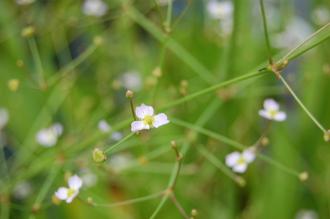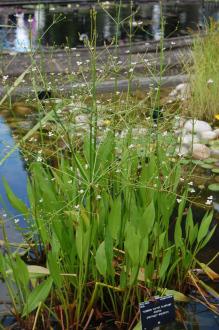
Alisma plantago-aquatica Flower (30/06/2012, Kew Gardens, London)
Position: Full sun
Flowering period: Summer
Soil: Wet, poorly drained (water depth of up to 30cm)
Eventual Height: 1m
Eventual Spread: 50cm
Hardiness: 5a – 9a
Family: Alismataceae
Alisma plantago-aquatica is a deciduous perennial marginal aquatic. Its green/ gray leaves are broadly lanceolate, arranged in basal rosettes, up to 15 cm long and 6cm broad. Its flowers have yellow stamen, three pale pink petals, are up to 1cm across and appear in the afternoon. The flowers appear in panicles on an erect upright, branched stem above the leaves. Its fruit is an acene and up to 3mm long. Its roots are rhizomes.
Alisma plantago-aquatica, commonly known as the Common Water-plantain, Devil’s Spoons, Thumbwort or Mad-dog Weed, is native to a large proportion of the Northern Hemisphere (including the UK). In its native habitat it grows in shallow water at the margins of bodies of fresh water and ditches. It is tolerant of fluctuating water levels and soil disturbance.
The etymological root of the binomial name Alisma is derived from a Celtic word meaning ‘water’. Plantago is in reference to the leaves of this plant being similar to the Plantain species. Aquatica is from the Latin meaning ‘aquatic’.

Alisma plantago-aquatica (30/06/2012, Kew Gardens, London)
The landscape architect may find Alisma plantago-aquatica useful native aquatic plant at pond and lake margins. It is also very useful in ditches, as it tolerates fluctuating water level, and may form a component of the planting for a SUDS (Sustainable Urban Drainage System) scheme.
Ecologically, A. plantago-aquatica is pollinated by flies.
A. plantago-aquatica prefers wet, poorly drained soils. It tolerates most pH of soil. It will grow in water up to 30cm deep.
Alisma plantago-aquatica requires little maintenance. Large clumps may be divided in spring.

